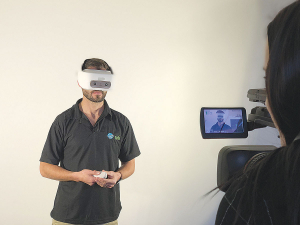NZ winegrowers advance vineyard biosecurity in 2025
The year was marked by “progress, collaboration and reflection” in biosecurity, says New Zealand Winegrowers Biosecurity Advisor Jim Herdman.
 ECO FRIENDLY: Reuben Turner inspects biosecurity training provider IVS’s new virtual shipping container.
ECO FRIENDLY: Reuben Turner inspects biosecurity training provider IVS’s new virtual shipping container.
Cutting edge technology designed to simulate biosecurity threats has emerged from the collaboration of two Hamilton companies.
A pioneering virtual reality shipping container packed with simulated biosecurity risk scenarios is helping preserve New Zealand’s ecosystem and way of living.
Independent Verification Services (IVS) in Hamilton has launched a new virtual reality (VR) simulation built by Hamilton software specialist Company-X. The Ministry of Primary Industries has approved the technology to be used in biosecurity refresher training.
The project was led by Company-X augmented and virtual reality specialist Lance Bauerfeind, with project manager Dilan Prasad and augmented and virtual reality generalist Wonkee Kim.
Using virtual reality to assess frontline staff dealing with imported goods was a New Zealand first, said IVS chief executive Peter Webb.
“It’s the first training course that is not undertaken in a classroom, using a written examination-style assessment. Instead, it offers an online course with a virtual reality assessment that lets trainees demonstrate their practical knowledge and skills.”
The technology provides trainees with a realistic environment to properly assess their abilities to detect and respond to biosecurity threats such as foreign insects and vegetation.
A wireless virtual reality headset allows the person to walk around the simulated container externally and internally, in the same way that they would in the real world.
“The virtual reality tool is the closest and more realistic assessment of skills,” Webb said. “It replicates real-life situations that may be encountered on the job.
“We randomise all the different things that can happen, like poisonous spiders,” Bauerfeind said.
“We can trick head movements so we know where they are looking.”
“We chose to work with the team at Company-X due to their experience and capability. The fact that they are based here in the Waikato, was also a bonus,” Webb said.
The project, Webb said, was the first step in what could be a transformational journey for the biosecurity industry in New Zealand. It uses virtual reality to train staff dealing with biosecurity contamination immediately post-border in the most realistic way.
“This technology has the potential to be used to educate all New Zealanders to identify and respond to biosecurity risks,” he said.
“IVS believes virtual reality could be instrumental to achieving a biosecurity team of 4.7 million, where all New Zealanders are aware of the importance of biosecurity and involved in pest and disease management, as set out in the Government’s Biosecurity 2025 strategy.
Castle Ridge Station has been named the Regional Supreme Winner at the Canterbury Ballance Farm Environment Awards.
The South Island Dairy Event has announced Jessica Findlay as the recipient of the BrightSIDE Scholarship Programme, recognising her commitment to furthering her education and future career in the New Zealand dairy industry.
New Zealand and Chile have signed a new arrangement designed to boost agricultural cooperation and drive sector success.
New DairyNZ research will help farmers mitigate the impacts of heat stress on herds in high-risk regions of the country.
Budou are being picked now in Bridge Pā, the most intense and exciting time of the year for the Greencollar team – and the harvest of the finest eating grapes is weeks earlier than expected.
The Real Estate Institute of New Zealand (REINZ) has released its latest rural property report, providing a detailed view of New Zealand’s rural real estate market for the 12 months ending December 2025.
OPINION: Expect the Indian free trade deal to feature strongly in the election campaign.
OPINION: One of the world's largest ice cream makers, Nestlé, is going cold on the viability of making the dessert.